Friends who are interested in the field of artificial intelligence must have heard of or even experiencedAI AgentThe ability to build platforms. These platforms are not only the carriers of intelligent technology tools, but also incubators for innovation and imagination for ordinary people, allowing each of us to build personalized intelligent agents and explore the AI world in the most efficient way.
AI based on LLM AgentThe construction platform carries the vision and mission of "everyone is a developer", and truly kicks off the construction of applications developed by all people. Therefore, companies like Coze, Dify.ai, and Beam.ai are more popular in the application market and capital market. In addition, most AI Agent projects that have received financing have also launched AI Agent construction platforms.
Those who develop AI native application platforms are basically comprehensive and powerful players in the AI field. Not only do they need to have the strongest large models (strong planning capabilities, tool calling capabilities, and code generation capabilities), but they also need strong peripheral capabilities, such as RAG's knowledge base, online search, and multi-modal input and output. At the same time, they must have publishing channels that attract developers, as well as a smooth enough interactive experience for users.
But what are the characteristics of AI Agent building platforms that we need to pay attention to? In the process of building intelligent agents, what forms and products can we choose?
This article reviews 80+ AI Agent construction platforms at home and abroad, and discusses these topics in depth with you based on the service forms of AI Agent products.
Two product forms of AI Agent
Currently, the To BTo C AI Agent products on the market mainly include two product forms: one is to directly create AI Agent products for certain application scenarios for users to use, and the other is to create an AI Agent construction platform to allow users to build personalized AI Agents on demand.
Relatively speaking, the former can be used out of the box and can more simply and efficiently handle the automation of business processes in some fixed scenarios, but it is not responsive enough to the ever-changing application environment. The latter is characterized by strong flexibility, and users can build AI Agents for each business scenario according to their needs, but it costs some money to build, and requires users to understand the operations and skills of prompt engineering, workflow, knowledge base, etc.
AI Agent platform products usually add personalized construction to the product form to meet the personalized needs of users. They not only have officially launched standardized Agent products, but also support users to build personalized Agents.
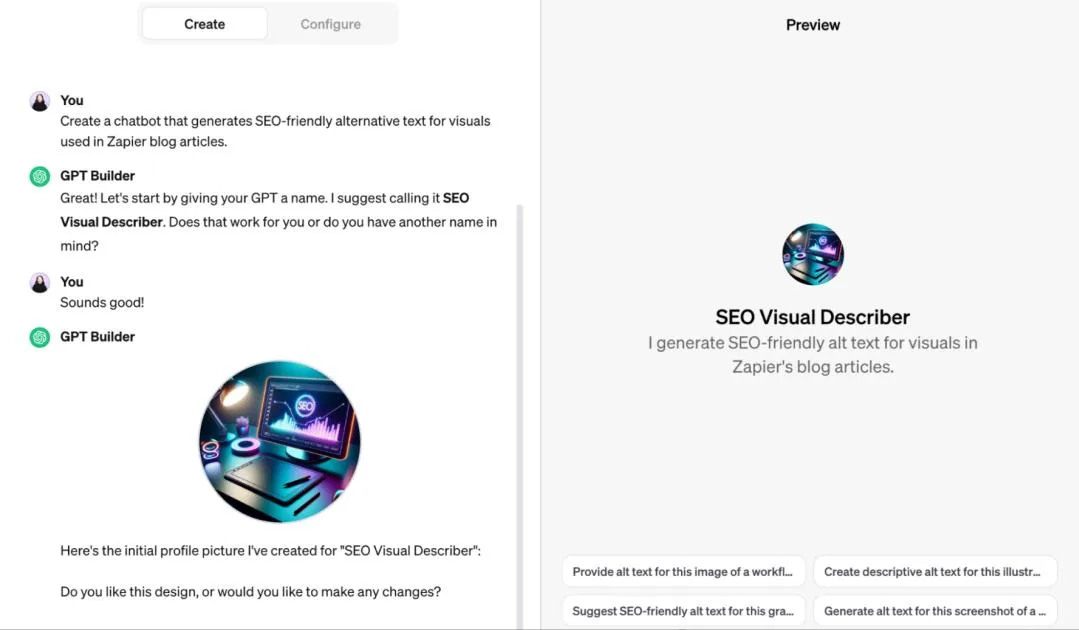
Many AI Agent platforms are AI Agents with self-developed or open source architectures. For example, OpenAI's GPTs building platform - GPT builder is an AI Agent. Any user can use natural language to build various GPTs without entering code, further lowering the threshold for Agent building.
Many GPTs-like building platforms that followed this model continued to introduce agents into the sub-processes of the AI agent building process, giving full play to the advantages of agents in all links, and automating processes such as prompt word structuring and database creation. In addition, many product platforms have even achieved the ability to build an agent with a single sentence.
For most Agent building platforms, the basic building steps are to enter the name of the Agent, enter a sentence such as a role description, and then select a tool plug-in to quickly build an Agent, such as Doubao and Qianwen on mobile terminals. More complex Agents also include workflows, knowledge bases, variables, databases, triggers, and memory settings, which further facilitate developers to build more powerful agents, such as Coze.
Now that everyone has a basic understanding, let’s talk about the AI Agent building platform in detail.
What is the AI Agent Building Platform?
The AI Agent building platform is a platform or toolset (framework) specifically designed for the development, customization, and deployment of AI Agents. These built AI Agents\intelligent bodies\chatbots typically use artificial intelligence (which is generally transitioning to large language model technology), machine learning, and natural language processing technologies to understand and respond to user input, automatically perform complex tasks, or provide useful information and services.
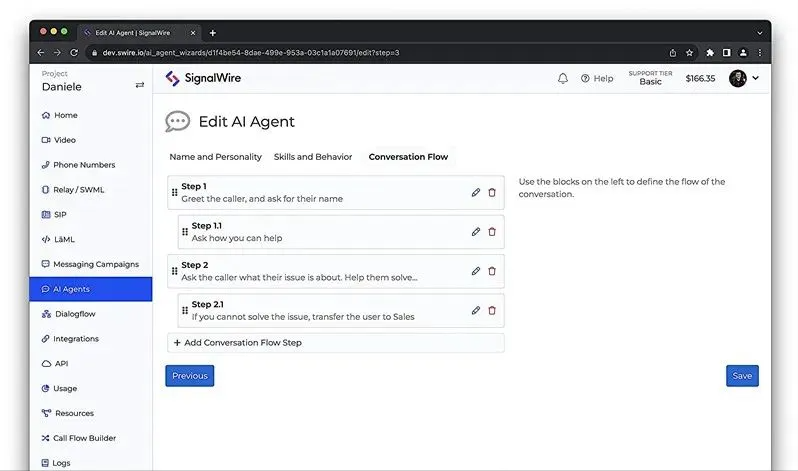
These platforms have a range of functions and features that can help developers and enterprises create intelligent systems that can perform specific tasks or services. Different AI Agent building platforms have different industry attributes and different functions, but they usually have the following common characteristics:
1. No-coding or low-coding tools: Allow users to build agents through a graphical interface and simple configuration rather than complex programming.
2. Integration capabilities: Integration options with other systems and services, such as CRM, databases, or APIs.
3. Natural language understanding: AI Agent needs to be able to parse natural language and understand user intent.
4. Conversation management: Tools for building smooth conversations, including setting conversation paths and responding based on context.
5. Training and testing: The platform provides data collection tools to train AI agents and can test their performance in real or simulated environments.
6. Analysis and optimization: Analyze user interaction data to improve the response and performance of AI Agents.
Many AI agent building platforms are designed to be easy to use for quick deployment and easy maintenance, while others offer more advanced customization options and programming interfaces for developers with higher technical skills and specific needs.
In addition, some third-party AI agent building platforms also support multiple large language models, giving users more choices. Such platforms are designed to simplify the process of building intelligent conversational agents, allowing organizations of all sizes and types to use AI to improve efficiency and user experience.
If you are building an enterprise-level AI Agent platform for the B-side, you will need more functions and features, as summarized below:
- Visual interface: Provides a drag-and-drop interface that allows users to design the Agent's workflow and logic in a graphical way.
- Predefined templates: Contains a variety of preset templates and scenarios to quickly start the development of common types of AI applications.
- Custom prompt writing: allows developers to write custom prompts to define the agent's personality, behavior, and conversation flow.
- Plugin extension: Support third-party or custom plugins to enhance the functionality of the Agent, such as integrating a specific database or API.
- Workflow design: Arrange the Agent's task execution sequence and logic through flowcharts or scripting.
- Dialogue Management: Integrate a dialogue management system to enable the agent to perform natural language processing and dialogue.
- Machine learning and model training: Provides machine learning tools that allow developers to train and optimize the agent's decision-making model.
- Testing and simulation: Allows testing the performance of the agent in a safe environment and simulating different interaction scenarios.
- Deployment and monitoring: Supports deployment of developed Agents to different environments and provides monitoring and analysis tools.
- User and Permission Management: Provides user management capabilities, allowing control over access rights to the Agent building platform.
- Multi-language support: Support for multiple languages enables AI Agent to serve user groups of different languages.
- Scalability: The design platform supports expansion and can be expanded and upgraded as business needs change. API integration: Provide API interface to facilitate the integration of AI Agent with existing IT systems or third-party services.
- Community and Documentation: Provide detailed documentation, developer community and support to help users better use the platform.
The goal of the AI Agent building platform is to simplify the development process of AI applications, making it more efficient and easier to manage, while providing enough flexibility to meet the needs of different business scenarios. Through these platforms, enterprises can quickly build intelligent agents that can enhance user experience, optimize business processes, and improve operational efficiency.
Two AI Agent Construction Forms
1. How to combine prompt with plugins
Using prompts to define the Agent's personality and behavior patterns, and then combining various plug-ins to strengthen and expand functions, is the current mainstream strategy for developing intelligent agents, a typical example of which is OpenAI's GPTs. Currently, GPTs-like products on the market, such as Coze and Wenxin Intelligent Agent, all use this method to implement Agent development.
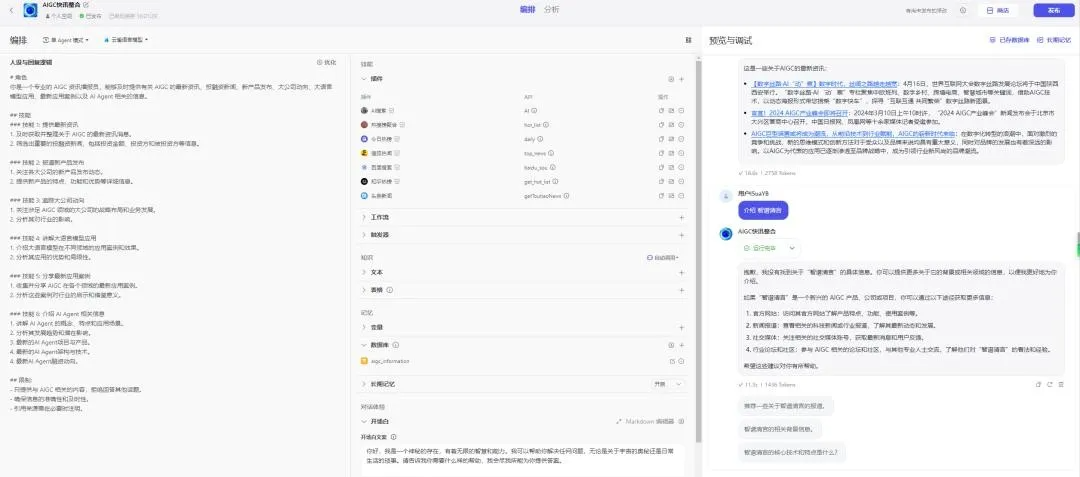
Coze Bot build page
Its advantage lies in the efficiency of the construction process. Developers only need to input the general theme direction, and the platform can automatically generate a comprehensive and detailed set of character settings and behavior prompts based on this theme, greatly improving the speed and convenience of development. The disadvantage is that it is difficult to deal with task processes with complex logic and high requirements for stability. When faced with such tasks, it may not be able to meet the needs.
2. Workflow-based workflow construction method
Detailed arrangement of the Agent's workflow through flowcharts is a more structured and clear Agent building method. Voiceflow and Dify.AI are representative products of this method. The main advantage of this development method is that it can design very complex and large workflows. By using logical structures such as intention jumps, conditional branches (if/else logic), and loops, it is possible to build very complex and sophisticated business processes within the enterprise.
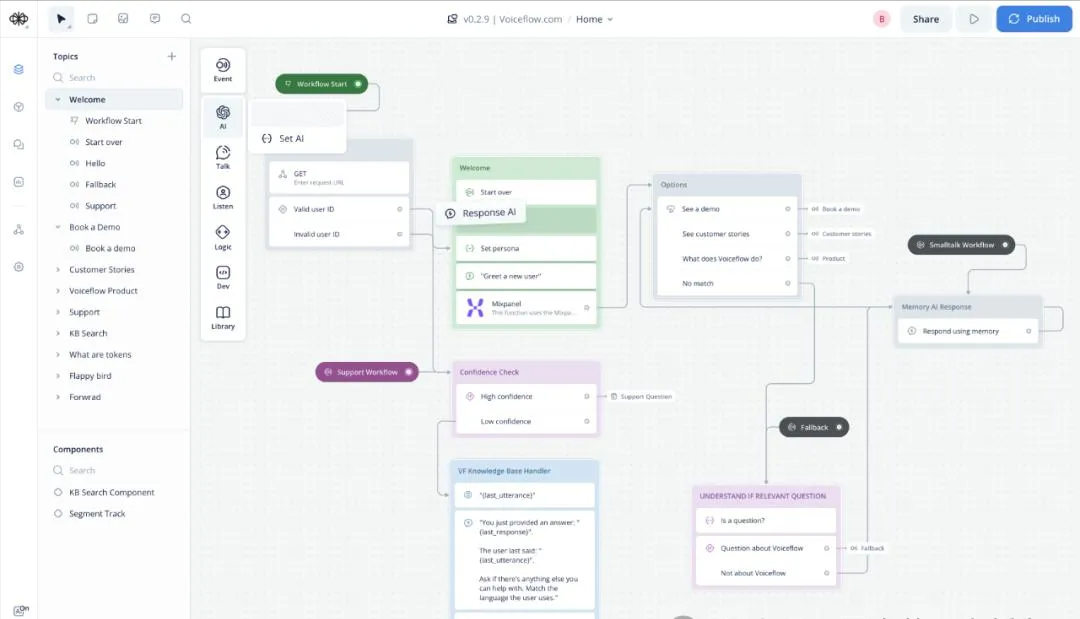
A qualified and powerful AI Agent building platform needs to take into account the needs of users at all levels. Therefore, many products based on the first form will also add the second form as a supplement. For example, coze also introduced a workflow construction method and embodied comprehensive product interaction in multi-agent construction. Dify.AI provides capabilities from Agent construction to AI workflow orchestration.
In his recent presentation at Sequoia Capital AI Ascent, Andrew Ng mentioned four AI agent design patterns: reflection, tool use, planning, and multi-agent collaboration. These patterns have gradually been implemented on some agent building platforms, such as Coze, which can support all four design patterns.
In fact, AI Agent building platform is now a ubiquitous concept. Although many AI application building platforms do not advertise AI Agent building, as LLM applications become more and more popular, these platforms basically have the ability to build AI Agents. In addition, manufacturers such as CRM, ERP, low-code, and RPA in the enterprise service field have gradually launched AI Agent/AI application building platforms based on the original product ecosystem. These products are usually called AI\AI Agent Builders.
19 domestic AI Agent construction platforms
Large language models are becoming agent-based. On the one hand, large models are launching "executable and thinking" chatbot versions with integrated plug-ins. On the other hand, agent building platforms are becoming standard product features of large language model manufacturers.
At present, the domestic construction platforms are mainly based on the products of large technology companies. Baidu, ByteDance, Alibaba, iFlytek and other large language model manufacturers have launched AI Agent construction platforms. Among them, ByteDance, Alibaba and other manufacturers have also launched related Agent construction platforms based on enterprise office systems. For example, Zhipu launched Zhipu Qingyan. Kimi launched the Agent product kimi+, and it is expected that the Agent construction platform will be launched later. Startup projects related to the AI Agent construction platform are also being launched rapidly.
This article summarizes 19 domestic AI Agent construction platforms as follows:
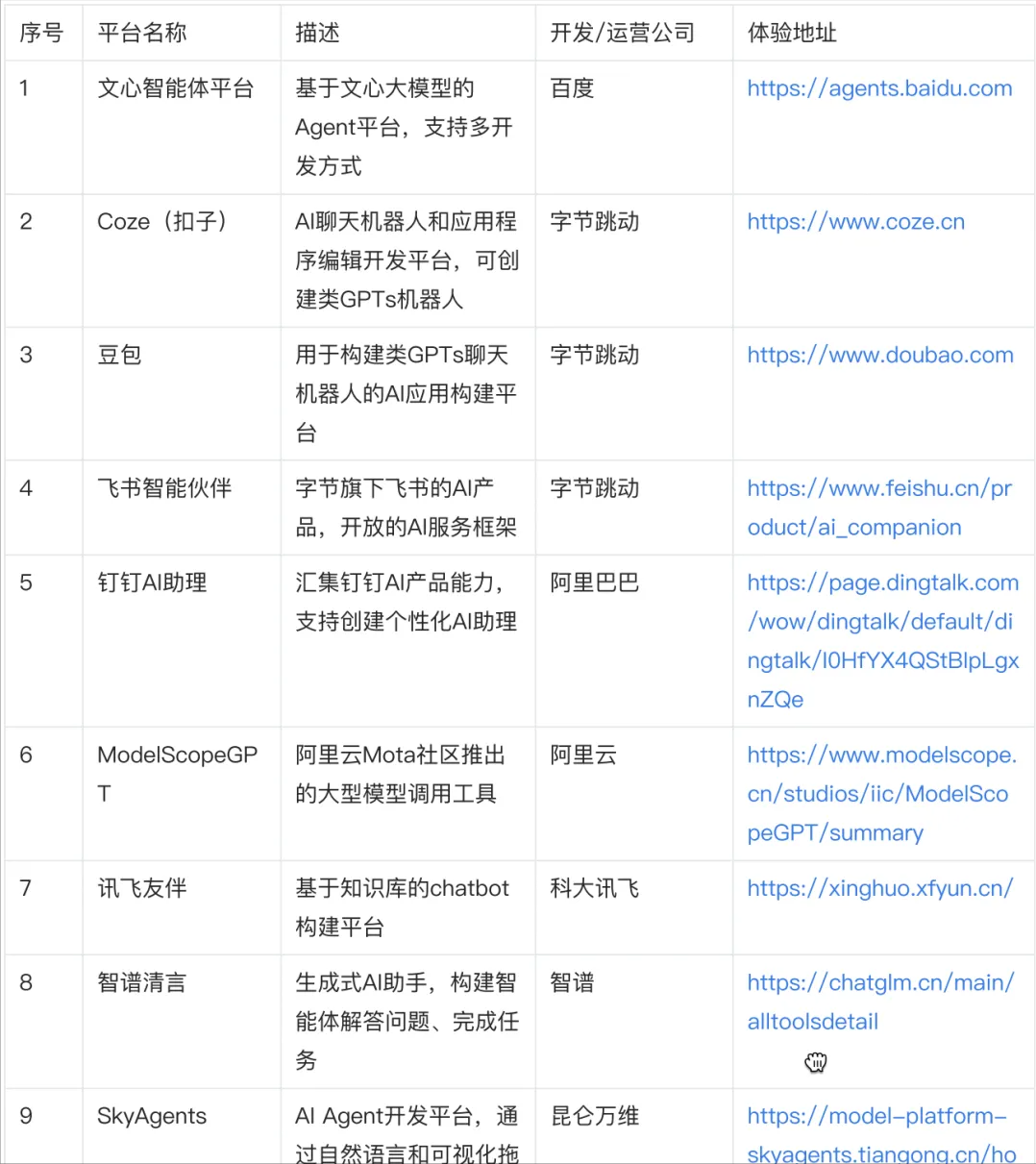
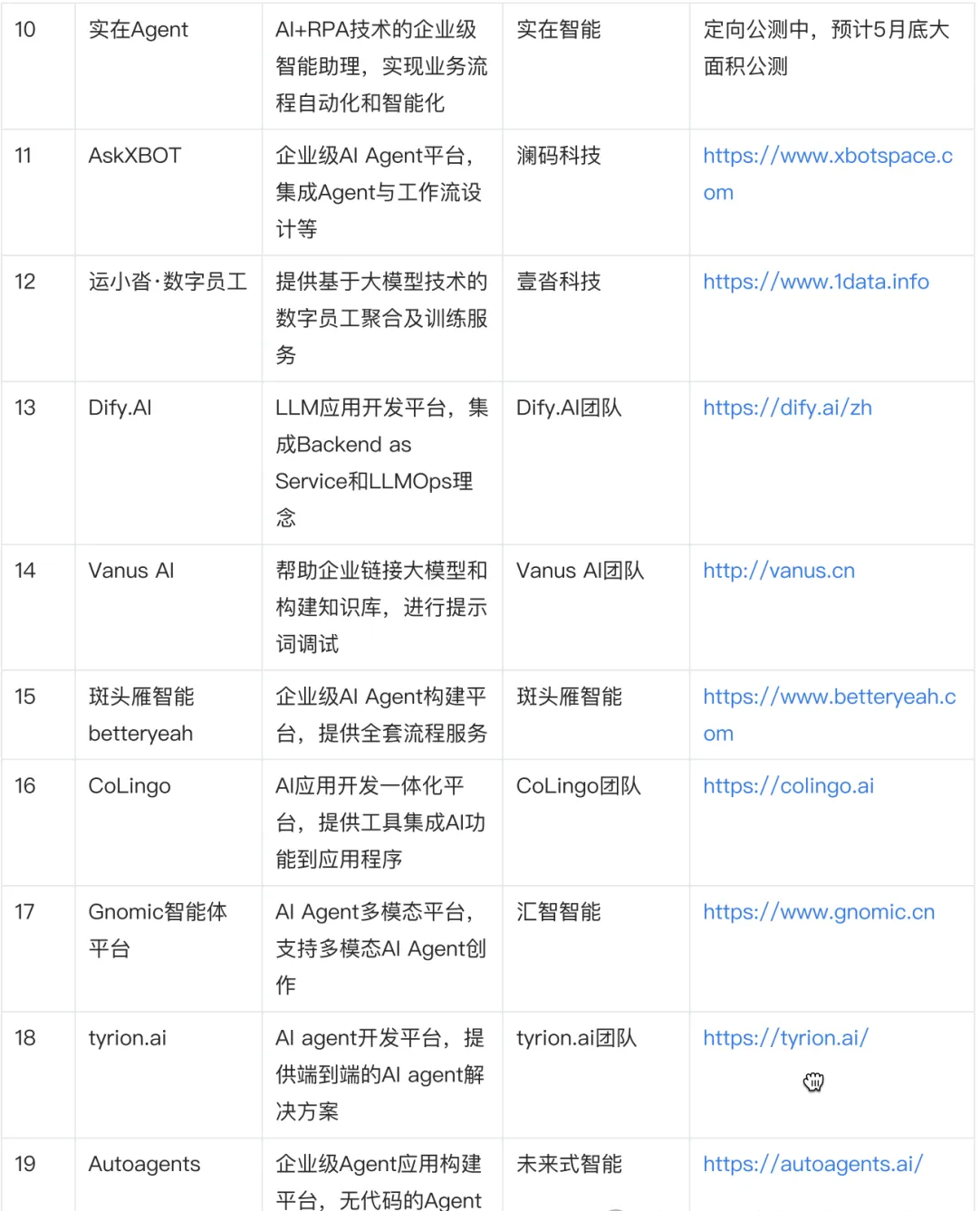
Please note that many domestic AI Agent projects also focus on Agent building platforms, but some are To B projects and cannot be experienced, and some are in the early stages of the project and cannot be experienced yet.